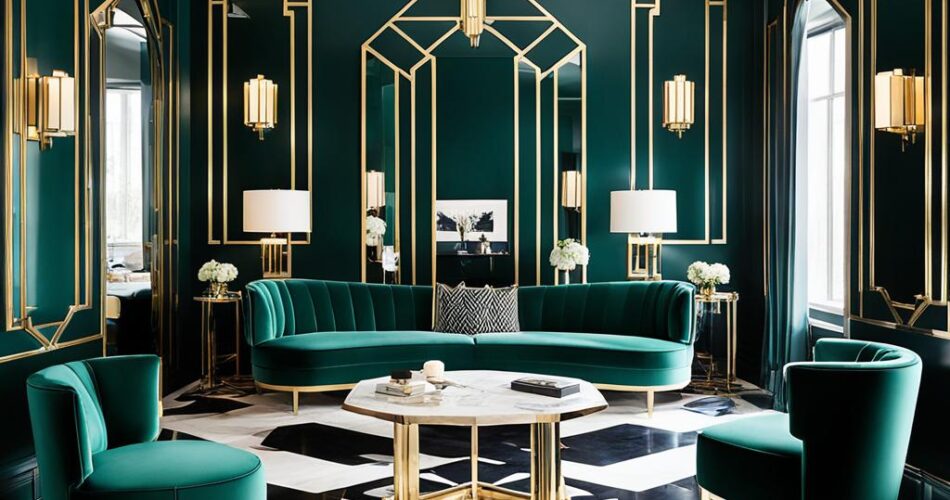Step into a world of glamour and vintage charm with art deco interior design. This timeless style turns ordinary spaces into elegant havens. It brings a luxurious feel to your home.
Art Deco started in the early 1900s as a way to bring beauty and splendor after World War I. Now, it still captures hearts with its bold colors, sharp shapes, and luxurious finishes.
Modern Art Deco mixes luxury with practicality. Imagine bright colors against neutral backgrounds, with shiny metallic touches. Marble floors, velvet fabrics, and textured woods make spaces both eye-catching and welcoming.
Want to add Art Deco style to your home? From eye-catching lighting to geometric patterns, there are many ways to do it. Let’s dive into how to make your living space glamorous.
The Timeless Appeal of Art Deco Style
Art Deco, born in the roaring twenties, still charms interior lovers today. This vintage style came after World War I. It marked a new era of wealth and progress.
Origins in the Roaring Twenties
Art Deco thrived from 1919 to 1939, starting in France. It became famous worldwide at the Exposition internationale des arts décoratifs et industriels modernes in Paris, 1925. This event highlighted the glamorous 1920s decor that shaped the era.
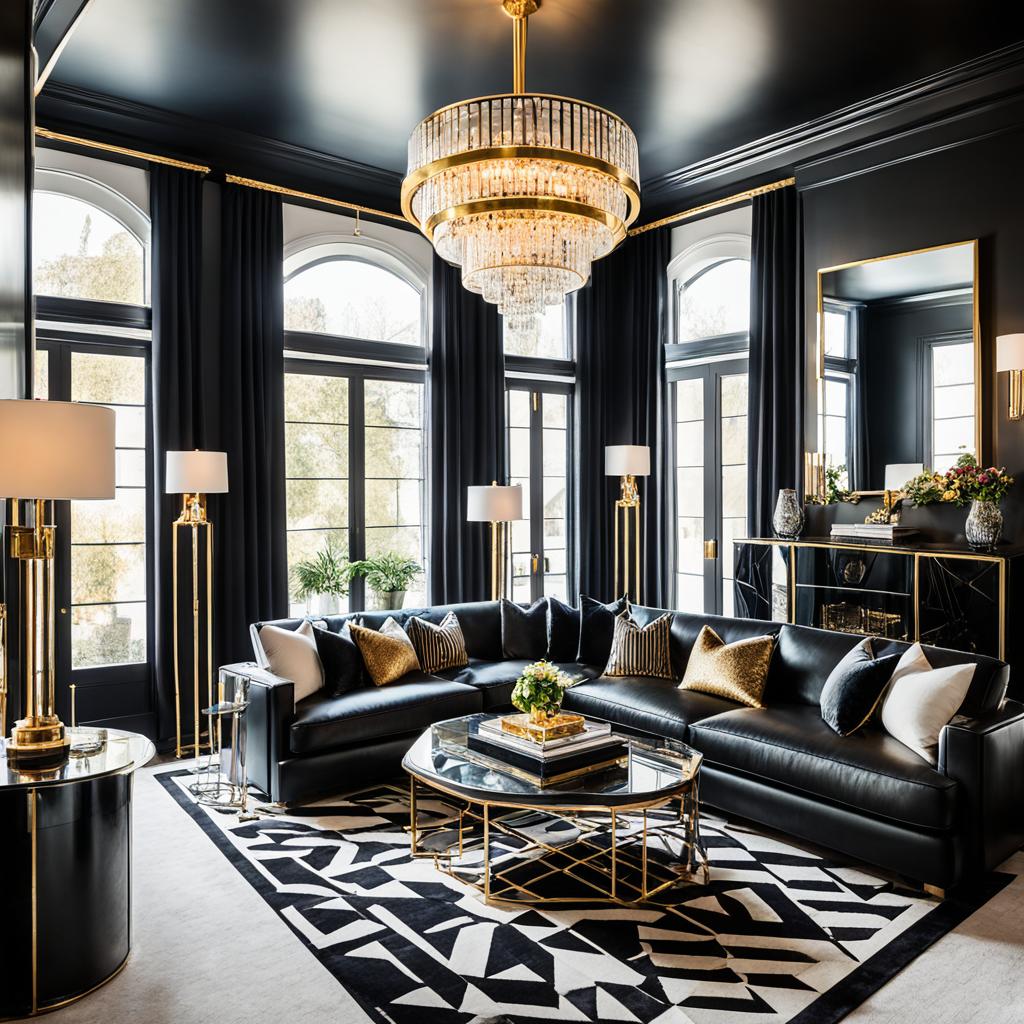
Key Characteristics of Art Deco Design
Art Deco interiors stand out with:
- Symmetrical layouts
- Bold geometric patterns
- Luxurious materials like velvet and marble
- Metallic finishes in chrome, brass, and gold
- Statement lighting fixtures
These features bring a touch of glam and grandeur to designs. The style often mixes rich textures, polished wood, and bold colors. Deep yellows and vibrant blues are common.
The Resurgence of Art Deco in Modern Interiors
Art Deco made a comeback in the 1960s and 1970s. The 1974 “The Great Gatsby” film brought it back into the spotlight. Now, designers mix vintage and modern furniture to bring Art Deco’s timeless beauty into today’s homes.
Art Deco Color Palettes: Bold and Beautiful
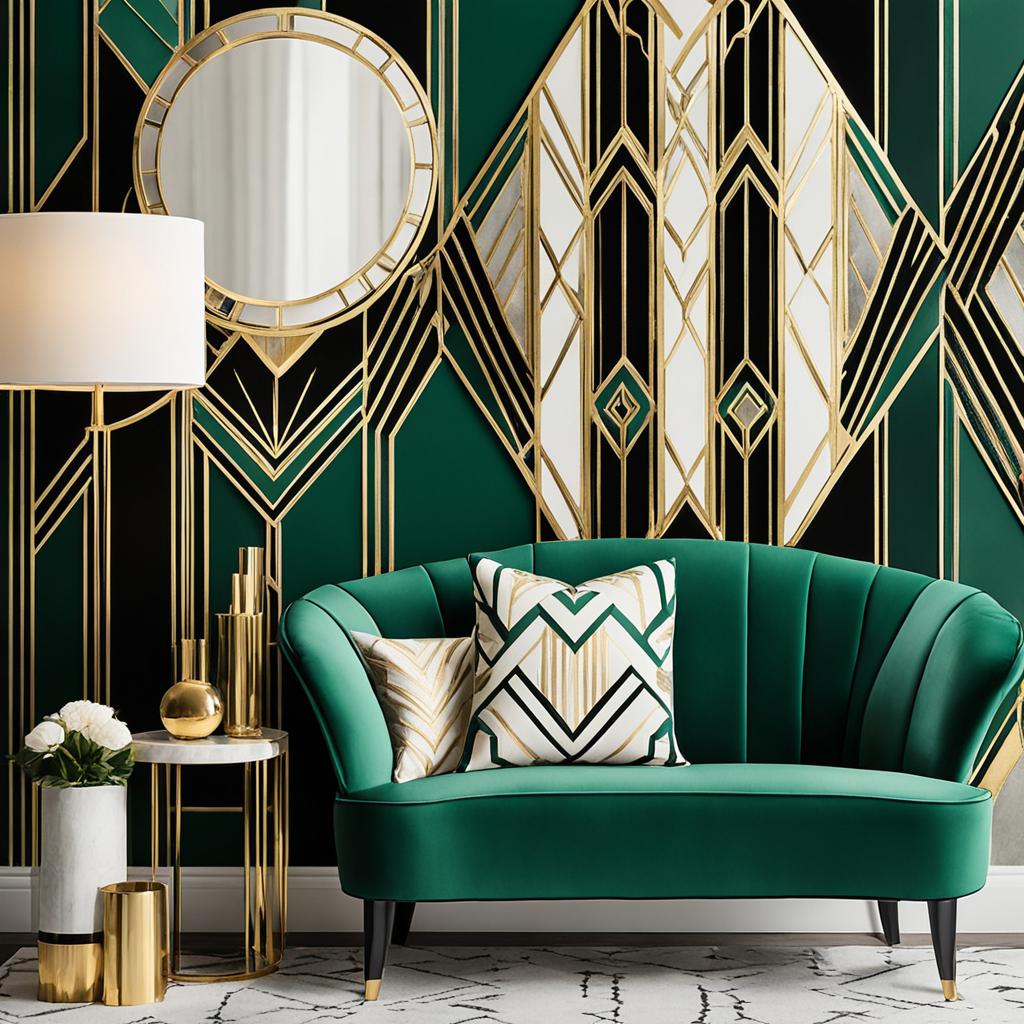
Art Deco color palettes are truly eye-catching. The 1920s brought in a time of bold colors and striking mixes. Deep greens, rich blues, and vibrant oranges were key. These colors make a room feel luxurious with metallic touches.
Jewel tones were big in Art Deco design. Colors like emerald green, sapphire blue, and ruby red brought back the glamour of the Roaring Twenties. These colors pair well with gold and silver, adding luxury to any area.
For a softer look, pastel shades were popular. Soft pinks, baby blues, and creamy yellows added charm. These gentle colors softened the sharp lines of Art Deco interiors.
Monochromatic palettes were also a big part of Art Deco style. Using different shades of one color added depth and interest. This method is great for modern spaces, giving a new spin to a classic look.
Art Deco colors still inspire designers today. They offer endless possibilities for both vintage and modern spaces. Whether you like bright colors or soft tones, Art Deco palettes have something for everyone.
Luxurious Materials in Art Deco Interior Design
Art Deco interiors sparkle with opulent materials that define the style’s lavish aesthetic. This design movement, born in 1925 Paris, embraces luxury at every turn. Let’s explore the key elements that make Art Deco spaces truly shine.
Opulent Metals: Gold, Brass, and Chrome
Metallic accents are the stars of Art Deco design. Gold adds warmth and glamour to any room. Brass fixtures offer a softer glow, while chrome brings a sleek, modern edge. These metals appear in lighting, hardware, and decorative pieces, creating a rich visual texture.
Rich Textures: Velvet, Lacquer, and Marble
Luxurious textures are crucial in Art Deco interiors. Velvet upholstery invites touch and adds depth to furniture. Lacquered surfaces shine with a mirror-like finish. Marble, used in countertops and flooring, brings natural elegance and cool sophistication to spaces.
Exotic Woods: Ebony and Zebrawood
Rare and beautiful woods elevate Art Deco furniture and wall panels. Ebony’s deep, dark tones create striking contrasts. Zebrawood, with its bold striped pattern, adds visual interest and exotic flair to any room.
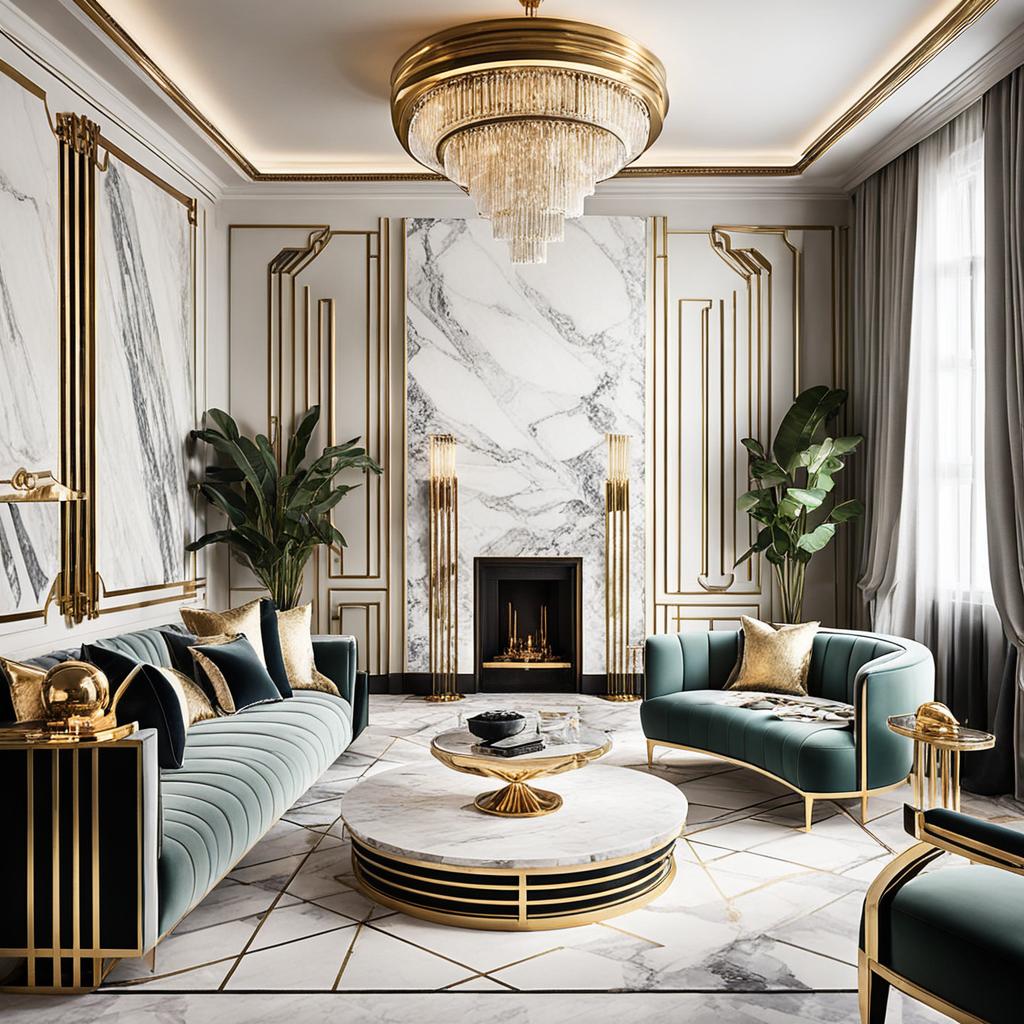
| Material | Common Uses | Characteristics |
|---|---|---|
| Gold | Light fixtures, frames | Warm, glamorous |
| Velvet | Upholstery, curtains | Soft, plush |
| Marble | Floors, countertops | Cool, elegant |
| Ebony | Furniture, paneling | Dark, dramatic |
These lavish materials combine to create the iconic Art Deco look. By mixing opulent metals, rich textures, and exotic woods, designers craft spaces that are both bold and beautiful. They capture the essence of this timeless style.
Geometric Patterns and Motifs
Art Deco design is all about bold geometric shapes and patterns. This style brings together luxury and modernity from the 1920s and 1930s. At its core, Art Deco features unique geometric motifs that make any space look interesting and sophisticated.
Zigzag patterns are a key feature of Art Deco. These lines add energy and movement to designs on wallpapers, textiles, and furniture. Chevron patterns, similar to zigzag, bring elegance to neutral bedrooms and living areas.
Symmetrical motifs are essential for the balanced look of Art Deco interiors. They include mirrored patterns and repeating shapes that bring order and harmony. Sunburst patterns, symbolizing optimism, often decorate mirrors, clocks, and wall art.
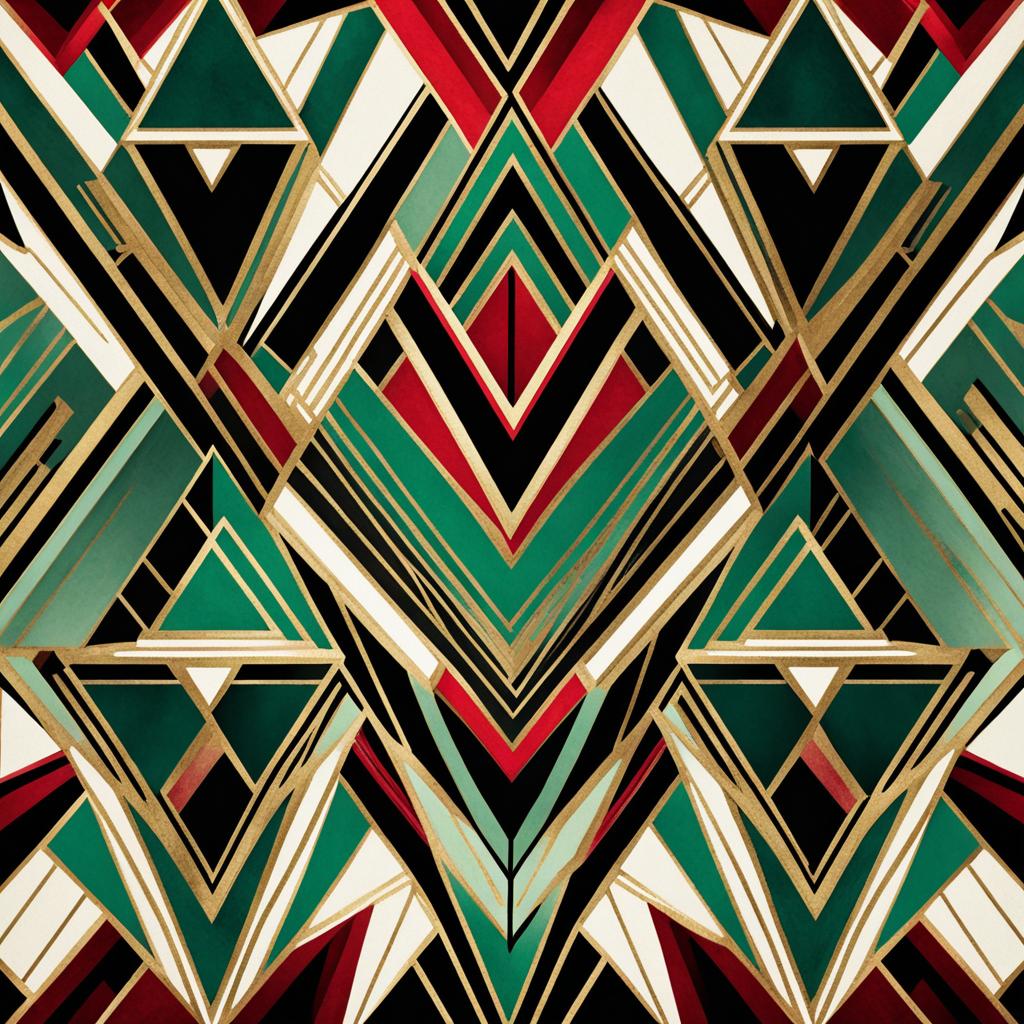
Abstract patterns, inspired by cubism and futurism, also shape Art Deco design. These complex patterns appear in rugs and tile work, adding depth and intrigue to floors and walls.
| Pattern | Common Application | Characteristic |
|---|---|---|
| Zigzag | Wallpaper, Textiles | Dynamic, Energetic |
| Chevron | Flooring, Upholstery | Elegant, Sophisticated |
| Sunburst | Mirrors, Wall Art | Optimistic, Radiant |
| Abstract | Rugs, Tile Work | Complex, Intriguing |
Adding these geometric shapes and patterns to your home brings the glamour of Art Deco into your life. Whether it’s a bold rug, patterned pillows, or striking wallpaper, these elements will definitely stand out in any room.
Furniture and Fixtures: The Essence of Art Deco
Art Deco furniture and fixtures are key to this iconic style. They come from the 1925 Paris Exposition. They add glamour to modern living spaces. Let’s look at what makes this design so captivating.
Streamlined Shapes and Symmetrical Designs
Art Deco furniture loves streamlined shapes and symmetrical designs. Imagine sleek sofas with curved backs and armchairs with geometric patterns. These pieces often use exotic woods like ebony or zebrawood. They are paired with luxurious velvet or leather upholstery.
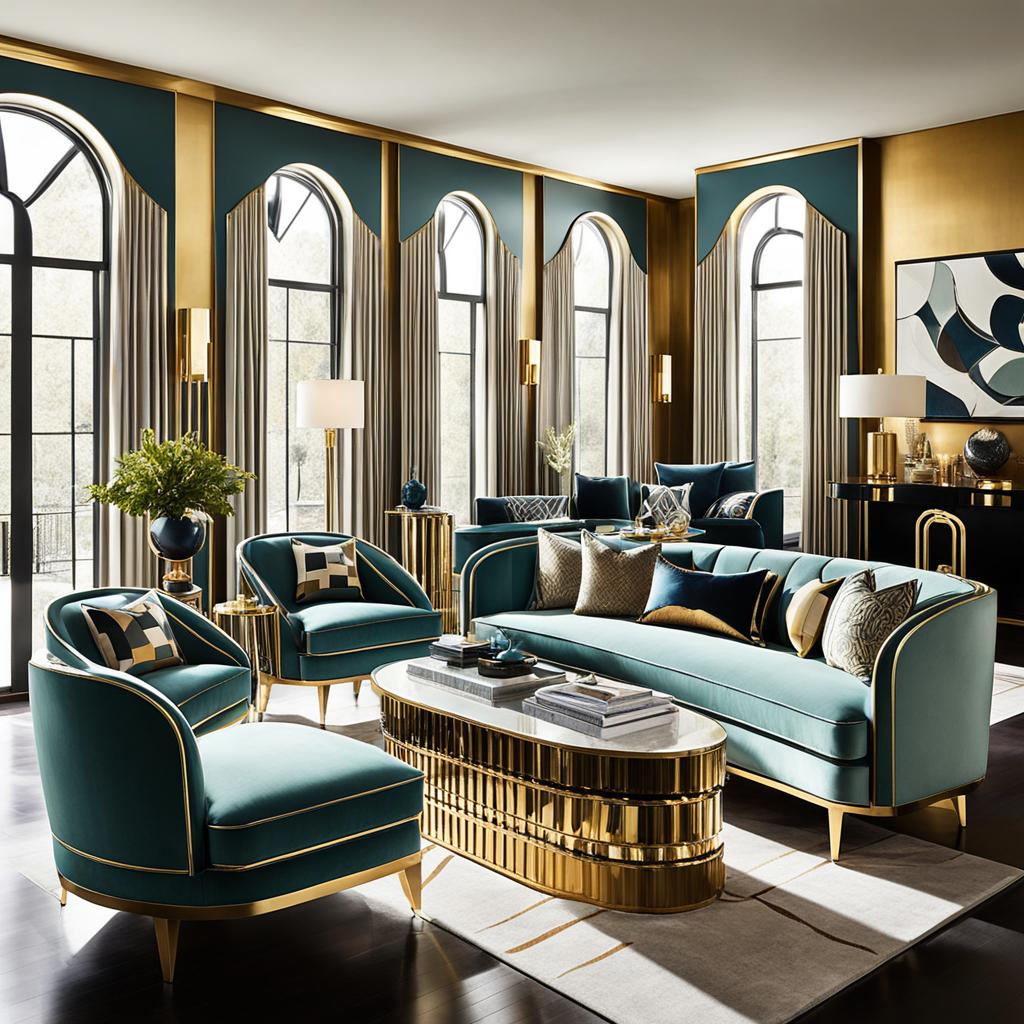
Statement Lighting: Chandeliers and Pendant Lights
Statement lighting is key in Art Deco interiors. Crystal chandeliers and brass pendant lights make a big impact. These lights often have geometric shapes, sunbursts, or stepped designs. They add visual interest and sophistication to any room.
Iconic Art Deco Furniture Pieces
Some furniture pieces are iconic in Art Deco style. Round accent chairs, mirrored cabinets, and chrome-legged tables are must-haves. These items often use bold colors like red, green, or gold. They create eye-catching focal points in a space.
| Furniture Type | Characteristics | Materials |
|---|---|---|
| Chairs | Curved backs, geometric patterns | Velvet, chrome, wood |
| Tables | Sleek lines, geometric bases | Glass, wood, metal accents |
| Cabinets | Mirrored surfaces, geometric hardware | Lacquered wood, chrome details |
Adding these elements brings Art Deco into your home. Remember, in Art Deco, “more is more.” Don’t be afraid to use bold, eye-catching pieces that make a statement.
Architectural Elements in Art Deco Interiors
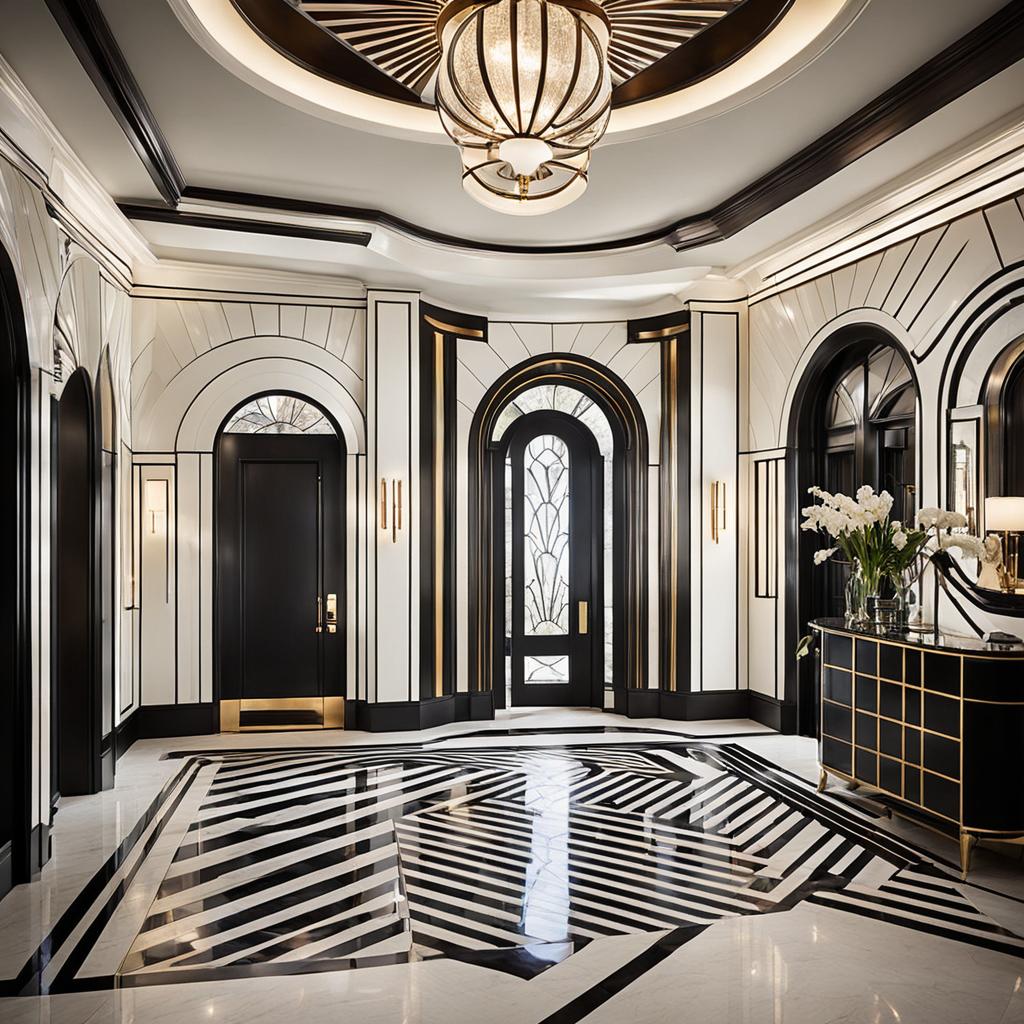
Art Deco interiors take us back to the glamorous 1920s and 30s. They mix form and function beautifully. This makes spaces both pretty and useful.
Crown molding is key to Art Deco design. It frames doors and ceilings with thick, fancy moldings. Built-in shelves with geometric patterns add style and storage.
Arches are big in Art Deco architecture. They make doorways and windows look dramatic. These arches often have fluted or ribbed textures for extra beauty.
| Architectural Element | Characteristics | Impact on Interior |
|---|---|---|
| Crown Molding | Thick, ornate, often gilded | Adds luxury and defines spaces |
| Built-in Shelving | Geometric patterns, clean lines | Provides storage and visual interest |
| Arches | Curved, often with fluted textures | Softens angular lines, creates flow |
These details together create the luxurious, streamlined look of Art Deco interiors. By using them, modern homeowners can bring this timeless style into their homes.
Art Deco Accessories and Accent Pieces
Art Deco style is all about its accessories and accent pieces. These glamorous accents are the perfect finishing touch for any Art Deco space. Let’s dive into some key elements that can turn your home into a 1920s dream.
Mirrors and Wall Art
Mirrors are a big part of Art Deco decor. Look for pieces with geometric frames or sunburst designs. Wall art with bold patterns or vintage scenes can take you back to the Roaring Twenties. Art deco wallpaper with metallic accents or repeating motifs is another way to stand out.
Decorative Objects and Sculptures
Decorative objects are key to an authentic Art Deco feel. Think sleek animal figurines, abstract sculptures, or vases with clean lines. These pieces often feature simple shapes like triangles, circles, and zigzags. Chrome, glass, and marble were popular materials back then.
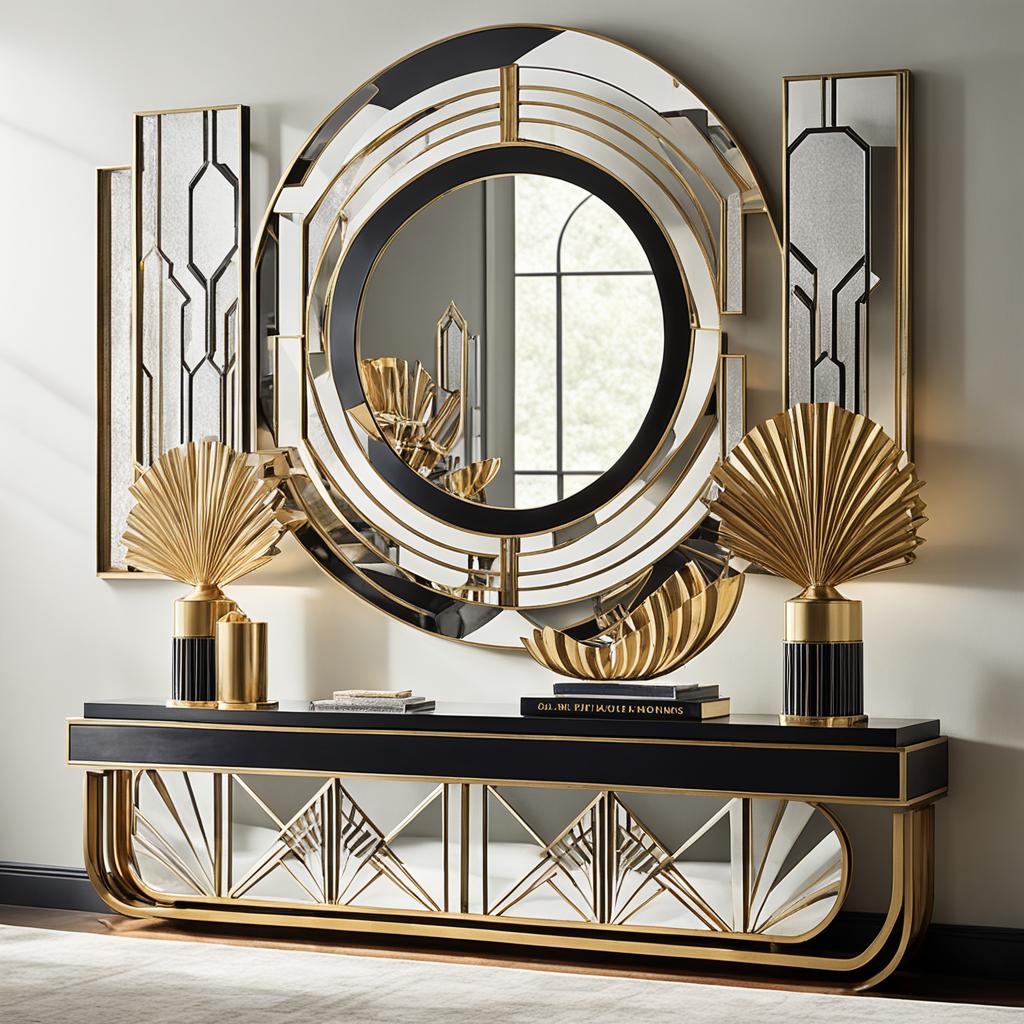
Textiles and Rugs
Textiles bring warmth and depth to Art Deco interiors. Look for rugs with bold geometric patterns or luxurious materials like silk. Throw pillows in rich jewel tones or with metallic accents can elevate your space. Don’t forget about curtains – choose fabrics with a sheen or subtle pattern to complete the look.
| Art Deco Accent | Key Features | Popular Materials |
|---|---|---|
| Mirrors | Geometric frames, Sunburst designs | Gold, Silver, Chrome |
| Wall Art | Bold patterns, Vintage scenes | Canvas, Metal prints |
| Sculptures | Abstract forms, Animal figures | Bronze, Marble, Glass |
| Rugs | Geometric patterns, Rich colors | Wool, Silk |
Creating Balance: Mixing Art Deco with Modern Elements
Mixing modern art deco with today’s designs makes a space stand out. The secret is finding the right balance between old and new. Aim for a mix of 20% vintage and 80% modern to create a space that honors the past and looks to the future.
To get that timeless look, add a statement piece like a velvet sofa in deep blue or grey. Combine it with smooth surfaces and soft textures to keep things looking good. Use natural materials like leather, wool, and linen for warmth and coziness.
Lighting is key in Art Deco spaces. Use a mix of ambient, task, and accent lights for depth and interest. Think about adding modern ceramic or concrete pendant lights as eye-catchers. They bring together Art Deco’s glamour with today’s simplicity.
Quality matters when mixing old and new styles. Choose high-quality items, both vintage and modern, for a unified look. Feel free to repurpose or update old favorites with new fabrics and colors. This way, you create a space that uniquely blends the old with the new.
